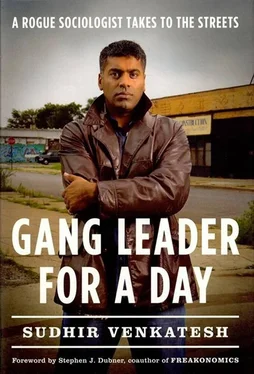That a tenant leader-one who was respected by politicians, shop owners, the police, and others-would praise a crack gang and work so closely with its leader made me realize just how desperate people could become in the projects. But I was learning that Ms. Bailey’s compromising position also arose out of her own personal ambitions: in order to retain her authority, she had to collaborate with the other power groups, in this case the gangs, who helped shape the status quo. This resulted in the bizarre spectacle of Ms. Bailey’s publicly defending the very people who were shooting and causing trouble for her tenant families. Even though it was obvious that tenant leaders had few good choices, I still wasn’t convinced that they needed to operate in such murky ethical waters. Nevertheless I found myself wondering how much Ms. Bailey’s actions were actually a response to hardships that limited her options and how much arose from her own desire to have power.
As the meeting broke up, people approached Ms. Bailey for one-on-one conversations. They all had their grievances: no hot water or a broken sink, a child getting in trouble, prostitutes taking clients into the stairwell, crack addicts partying the whole night.
Afterward Ms. Bailey motioned me into her office. Catrina was looking over some notes she’d taken at the meeting. Ms. Bailey asked her to get together with Millie, the LAC secretary, to prepare a list of tenant concerns to pass along to the CHA.
Ms. Bailey opened a small refrigerator and took out sodas for all of us. Grabbing a small blue rag, she wiped her sweaty forehead. “Did that live up to your expectations?” she asked me with a wink.
“Well, I thought you were just going to make a few announcements!” I said, laughing. “What do you do with everything you heard? I mean, a lot of it was directed at you. They were saying some pretty harsh things.”
“We tell the CHA that things ain’t working in the building, and we try to get them to fix it. That’s it.”
“And do you tell them about residents accusing you of taking gang money?”
“We tell the CHA that things ain’t working in the building, and we try to get them to fix it.”
She smiled cunningly and looked over to Catrina, who returned the dutiful glance of an ever-loyal junior officer.
“Sudhir, you have to remember something,” Ms. Bailey continued. “In the projects it’s more important that you take care of the problem first. Then you worry about how you took care of the problem.” I opened my mouth to object, but she stopped me. “If no one dies, then all the complaining don’t mean nothing, because I’m doing my job. If all I got to worry about is a few people wondering where the money’s coming from, then around here that’s a good day! No one dies, no one gets hurt, I’m doing my job.”
“That’s an awful way to live,” I blurted out.
“Now you’re starting to understand,” she said in a tone somewhere between pedantic and patronizing. “Maybe you’re even starting to learn.”
Someone knocked on the door, and Ms. Bailey got up to answer it. Catrina leaned in toward me. “Watch how she helps people,” she whispered. “She says it don’t matter, but she’s amazing. Have you seen how she gets apartments fixed around here?”
I told her that I hadn’t.
“Have you seen how she helps women around here?” Catrina pushed her glasses up the bridge of her nose and kept her voice low. I felt as if we were in high school and I was sneaking a conversation with the teacher’s pet.
“Well, Ms. Bailey gives away food to the mothers, right?” I whispered back.
Catrina shook her head and inhaled deeply, looking disappointed in me. “That’s not what I’m talking about. You watch what she does when she helps women. Pay attention to that.” Her voice was insistent, but she offered no more details. “She is the most amazing person I know.”
As I spent more time with Ms. Bailey over the coming months, I found that most tenants were less suspicious of me than they’d been in the past. Sometimes, when a tenant came into Ms. Bailey’s office to talk about a problem, the tenant would say, “It’s okay, I don’t mind if Sudhir listens.”
Like J.T., Ms. Bailey seemed to enjoy the fact that I was interested in her. Perhaps she, too, thought I was going to be her personal biographer. I could see why she might make this assumption. I took every opportunity to express my fascination for her life, which seemed more fascinating the more I hung around.
One cold winter morning, I sat in Ms. Bailey’s office with Catrina. It was a slow day, and only a few tenants visited. Ms. Bailey asked if I would go out and get her some coffee, and Catrina came with me. We bundled up and trudged through eight inches of fresh snow. The wind was nearly strong enough to blow you over; it was too cold for even a conversation. Catrina and I just concentrated on stepping in the footprints of people who’d made a first pass in the snow. Catrina wondered aloud what kind of God would make the earth so cold.
As we slogged our way back to the building, coffee and doughnuts in hand, a young woman hurried over to us as best as she could. “Catrina, you got to come quick,” she said. “Ms. Bailey ran upstairs to Taneesha’s apartment. She said you have to call Officer Reggie.”
Catrina shoved the coffee at me and ran off as fast as possible under the circumstances. Since tenants had a tough time getting the police to respond, Ms. Bailey summoned Officer Reggie, the cop who’d grown up in Robert Taylor, when the situation warranted.
“Where’s Taneesha live?” I yelled.
The young woman who’d summoned Catrina shouted back over her shoulder, “Twelve-oh-four!”
Approaching the building, I encountered a couple of J.T.’s gang members. They wore brown work boots and thick down jackets with the Oakland Raiders’ distinctive silver-and-black insignia. To me it seemed too cold for business, but I could see a steady stream of cars coming down the alley to buy drugs. White and black addicts jumped out of their cars and ran into the lobby to buy crack. As I walked inside, one of J.T.’s men shouted to me, “They’re up on the twelfth. Elevator’s broken.”
The stairwells were brutally cold. I had to stop a few times to catch my breath. I came across quite a few other people, all of them upset by the broken elevators. “Merry fucking Christmas,” one said to me bitterly as he passed by with a heavy laundry bag.
As I stepped into the gallery on the twelfth floor, I saw a group of men standing outside Apartment 1204. I recognized C-Note and a few other squatters among them. They were all moving about, trying to keep warm, some of them jumping up and down. The gallery floor was concrete, so even if you were wearing thick-soled shoes, the cold still shot up your legs.
The door of 1204 was partially open. Ms. Bailey stood over the sofa and, when she caught sight of me, beckoned me inside. I had met Taneesha a few times, most recently at her twenty-first birthday party, which J.T. had thrown. She was tall and very pretty, with long, straight black hair, and she was trying to make a career as a model. She currently modeled clothes at various nightclubs-so-called lingerie parties-and also went to college at night. She had a baby boy, Justin, named for her favorite high-school teacher, who had encouraged her to pursue modeling.
Everyone suspected that J.T. was the baby’s father. He had told me never to ask him about the baby.
The light in her apartment was dim, but bright enough to show that her face was beaten badly and her white T-shirt was stained with blood. Her breathing was labored, her eyes closed; you could hear the blood gurgling in her mouth. Another young woman held her hand and comforted her. “They’re coming,” she said, “the ambulance is coming. Just relax, ’Neesha.”
Читать дальше












